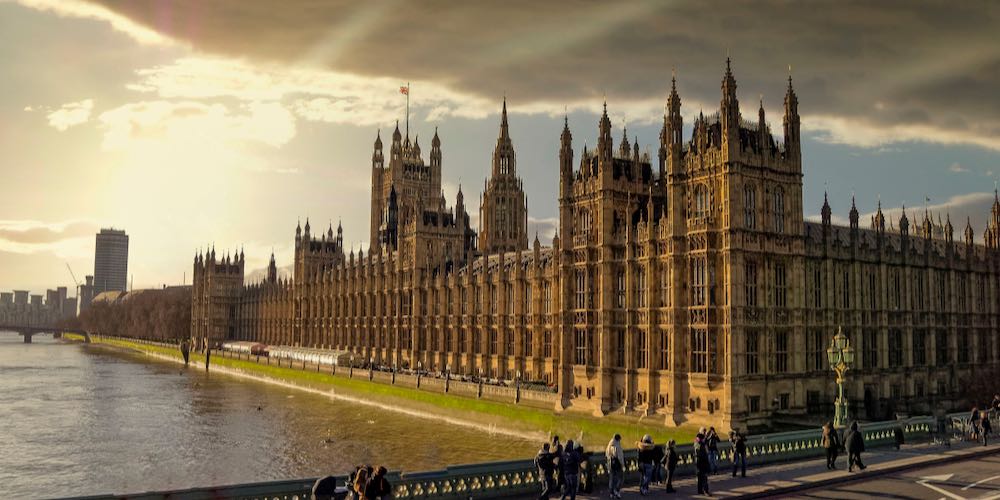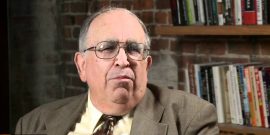The Tragedy of Macbeth uses the sharp angles, intense close-ups, and geometric lighting of film noir to convey the dread of a tormented soul.
Britain's Shakespearean Constitution
When teaching constitutional law in the United Kingdom, one of the first challenges is to reflect on where the British constitution gets its authority. We say, for example, that it is not merely a rule that the Prime Minister must be a member of the House of Commons, but a constitutional rule. Likewise, we say that the King may do nothing except on ministerial advice—normally, prime ministerial advice—and that this is a rule of the constitution. We say these things because we wish to deepen and entrench the status of such rules. We regard them as fundamental, and we reach for the rhetoric of the constitution to signify this sense of fundamentality.
Of course, in the United Kingdom, we have no document or codified text we can point to as authority for our proposition that the Prime Minister must be a member of the Commons or that the King may act only on the advice of ministers. Like New Zealand’s, the British constitution is “unwritten.” That is an inapt term. Almost all of the UK’s constitution is written down, somewhere. But it is not codified. There is no single authoritative text.
If the British constitution does not obtain its authority from a governing text, where does it obtain its authority from? Of late, it has become fashionable in British law schools to imagine that the constitution is based on (and obtains its authority from) a number of fundamental principles. Some say that parliamentary accountability is a fundamental principle; some say democracy is. Such commentators go on to say these principles explain why we have rules such as the two I’m using as examples. They tell us it is important that the prime minister is a member of the House of Commons because it is to the House of Commons that the PM must discharge his (or her) constitutional obligations, subjecting himself to parliamentary accountability.
That is why we have Prime Minister’s Questions every week, and so on. Likewise, it is important that the King understands that, in today’s constitutional order, the forces of monarchy have been well and truly subjected to those of democracy. The King remains head of state but he is unelected. He owes his position to an accident of birth, not to the ballot box, but it is the latter that rules. Ministers are accountable to the representatives of the people. Thus the King must act only and always on ministerial advice: the principle of democracy insists upon it.
This style of constitutional reasoning may seem logical. It may appear to be rational—grounded in reason and, as such, consistent with the Enlightenment principles upon which all modern constitutionalism is said to be based.
And yet I am entirely unpersuaded by it. One may admire this style of constitutional reasoning as a matter of elegance, but does it hold up? Does it not, indeed, beg the rather obvious question: where do the principles come from, and who decides (in the context of an uncodified constitution) what “counts” as a fundamental constitutional principle and what does not? Why is parliamentary accountability a constitutional principle and how did it become one? On whose authority has democracy become a trump card, subjecting even the King himself to the will of the people?
The many centuries of English, Scottish, Welsh, and Irish history make for an overwhelming canvas. No one could master it all, so we have to pick and choose—even when we only wish to grasp the historical foundations of our law.
These questions—and many more like them—are answerable. But, in the end, they are answerable not on the basis of any claim to a higher authority or abstract principle. They are answerable only by reference to history. The British constitution does not obtain its authority from a written legal text. Instead, it owes its authority to the past—to its history. The reason why ministers, from the PM down, are accountable to the House of Commons owes its explanation to no philosophy of modern constitutionalism (after all, there is no equivalent in the US Constitution). Rather, it owes its explanation, both as a descriptive fact and as a norm of constitutional behaviour, to history. It is because Parliament insisted upon it, first on the battlefields of the Civil Wars of the 1640s and thereafter in legislation. Likewise, the reason why the King may act only on ministerial advice and may not use his undoubted prerogative powers to thwart or to run counter to what ministers want is because, by the end of the seventeenth century, Parliament had won for itself not only the right to hold the Crown’s ministers to account, but the right to determine the powers of the Crown itself and, if necessary (as it was in 1688), to remove the Crown from the incumbent’s head and place it on someone else’s instead. None of this can be readily explained as a matter of constitutional rationality, reason, or principle. These are binding and genuinely fundamental rules of constitutional behaviour in the United Kingdom—and they are so because our history demands it.
The United Kingdom is not an especially old country. In its current form, it dates only from the 1920s, when the United Kingdom of Great Britain and Ireland became the United Kingdom of Great Britain and Northern Ireland. But the UK is composed of four exceptionally old nations, all of which have constitutional histories that reach back into the deep past. England is the dominant partner (it has about 85% of the UK’s population and is responsible for about the same share of the UK’s GDP), although Scottish, Welsh, and Irish history have each made decisive contributions to the UK’s interweaving story. The many centuries of English, Scottish, Welsh, and Irish history make for an overwhelming canvas. No one could master it all, so we have to pick and choose—even when we only wish to grasp the historical foundations of our law. Mostly, we venture no further back than the Civil Wars of the 1640s and the Glorious Revolution of 1688–89, which finally resolved the constitutional disagreements that had helped to fuel them. Occasionally, we may mention Magna Carta, which dates from 1215, but even then we tend to do so anachronistically, and, certainly, few ever say anything about the four centuries which separate it from the constitutional conflicts of the seventeenth century.
This is a shame, as there is much that can usefully be learned about today’s constitution from the medieval political orders of the Middle Ages. One could start with Henry de Bracton, for example, and his thirteenth-century writings on kingship. Or with Sir John Fortescue’s De Laudibus Legum Angliae, written in the 1470s as a handbook for Edward IV but not published until the 1540s (well into the reign of Henry VIII). Or one could read Sir Thomas Smith’s brilliant Elizabethan overview of Tudor government, De Republica Anglorum, first published in 1583. All contain insights about the nature of rulership and government which remain pertinent to this day. Fortescue, for example, is as compelling as Sir William Blackstone’s Commentaries are, written in the 1760s, that the genius of the English constitution is its mixing together of elements of monarchy, aristocracy, and democracy. Blackstone was adamant that it was the mixed nature of the constitution that had given England her stability. But he was hardly the first great English jurist to alight upon this theme. Fortescue beat him to it by some three hundred years.
I confess that I do not teach Bracton, Fortescue, or Sir Thomas Smith to my constitutional law students. Perhaps I should. Were I to try to convey a sense of the ongoing importance of today’s British constitution of the late Middle Ages, I would be inclined to reach first for Shakespeare. In particular, I would cite his great tetralogy of history plays, Richard II, the two parts of Henry IV, and Henry V. These are not only Shakespeare’s best histories: they are among the finest of all his plays. Richard II is a story of weak and conflicted rulership, when the ruler doubts himself and crumples under the weight of leadership. Henry IV is a story both of guilt (aka, the burden of taking responsibility for the means by which you have obtained power) and of the public/private split, asking us to reflect on the moral fibre of our putative leaders, as reflected not only in their public action but also in their private behaviour.
The dominant figure in the first story is of course the king, who usurped Richard’s Crown to become Henry IV; the dominant figure in the second is his son (and heir) Hal, who will rise to become Henry V. The closing of the quartet, Henry V, is a study in leadership, principally but not only in war. It is a case study of how to take men with you, how to lead from the front knowing that the loyalty of those behind you is not only publicly displayed but—far more important, then as now—inwardly felt. The Chorus puts it thus, at the opening of Act 4:
For forth he goes and visits all his host.
Bids them good morrow with a modest smile
And calls them brothers, friends, and countrymen.
Upon his royal face there is no note
How dread an army hath enrounded him …
But freshly looks and overbears attaint
With cheerful semblance and sweet majesty.
That every wretch, pining and pale before,
Beholding him, plucks comfort from his looks.
A largess universal, like the sun,
His liberal eye doth give to everyone,
Thawing cold fear, that mean and gentle all
Behold, as may unworthiness define.
A little touch of Harry in the night.
Henry is about to lead his troops in war. Outnumbered by the “confident and over-lusty” French, they fear decimation. But the king instead leads them to victory, and to glory.
Of the numerous constitutional insights contained within these majestic and brilliant plays, let me highlight just two, as illustrations of how Shakespeare can be used to illuminate aspects of constitutional law. The first concerns the identity of the state. What is it, this thing, which is constituted by the constitution? This is a question that, in the Anglo-American mainstream, lawyers have not spent enough time worrying about. (It is quite different in the French tradition, where la pouvoir constituant has been a fixation of constitutional theorists since at least the Abbé Sieyès). Perhaps now, as the rise of populism challenges us to consider where the limits should be set to the idea of popular sovereignty, we are belatedly coming around to the realisation that it is not just constituted power we should worry about, but constituent power too. Who has the authority to constitute the state—and what is the state, anyway? These are the foundational concerns of Richard II and they are most powerfully expressed in a speech, loaded with pathos, of the king himself (the speech, “Of comfort no man speak”, in Act 3, scene 2).
It isn’t popular sovereignty on which Richard ruminates, but his own supposed sovereignty—the sovereignty, that is, which literally embodies the state. The physical embodiment of the state is Richard himself. He realises his body is at once his own (as a man) and the manifestation of the state (as king). It is no accident that Ernst Kantorowicz, in his great study of what he called “medieval political theology,” The King’s Two Bodies (1957), devoted an entire chapter of his analysis to Shakespeare’s Richard II. Richard instructs his companions to:
… sit upon the ground
And tell sad stories of the death of kings,
How some have been deposed, some slain in war,
Some haunted by the ghosts they have deposed,
Some poisoned by their wives, some sleeping killed …
“All murdered,” he blasts. He is inviting his companions (and by extension us) to reflect not only on what it means for the king to die, but what it means for the state. It is worth recalling that Shakespeare is writing at a time when it was treason—a capital offence, no less—to imagine the king’s death. The passing of the monarch risked the passing of the body politic itself. It was a moment of extreme frailty and fragility. And yet, as Richard laments, it is wired into the system (a feature, not a bug). All the king is granted is “a breath, a little scene ǀ To monarchise, be feared, and kill with looks”. Death is never far away. It is “vain conceit” to imagine that the king’s “flesh which walls about our life ǀ Were brass impregnable.” All it takes for death to bore through the king’s flesh—his castle wall—is “a little pin … and farewell king.” The truth, Richard concedes, is that his subjects:
have but mistook me all this while,
I live with bread like you, feel want,
Taste grief, need friends.
“Subjected thus,” he asks, “How can you say to me I am a king?” What goes for the king as sovereign goes likewise for any other body making a claim to sovereignty, even the people themselves. Who are we, to think we have the power to lay down the law, the law of the constitution, no less? Are we not mere flesh, living with bread, feeling want, tasting grief, and needing friends? How do we square our own mortal, quotidian ordinariness with the exceptional power we arrogate to ourselves to exercise popular sovereignty? Richard II helps us begin to articulate these questions in a way few other texts can approach.
My second example of contemporary constitutional insight drawn from Shakespeare comes from the end of Henry IV Part 2. Upon his father’s demise, Hal has acceded to the throne—he is now King Henry V. He meets two older men, each very different from the other, both of whom have played an avuncular role in his life. One is Falstaff, Hal’s great lord of misrule. Sir John is clearly expecting preferment but instead is unceremoniously dumped—banished from court with the cutting words, “I know thee not, old man.”
The other is the late king’s Lord Chief Justice who, we are told, had once had Hal arrested and detained for breach of the peace. The judge fears—indeed, he knows—that the new king “loves [him] not” (Act 5, scene 1). He is expecting, at best, to be dismissed. But the new king surprises him by retaining him in office, telling him to:
… still bear the balance and the sword;
And I do wish your honours may increase
Till you do live to see a son of mine
Offend you and obey you as I did.
So shall I live to speak my father’s words;
“Happy am I that I have a man so bold
That dares do justice on my proper son,
And not less happy having such a son
That would deliver up his greatness so
Into the hands of Justice.” You did commit me,
For which I do commit into your hand
Th’unstainèd sword that you have used to bear,
With this remembrance: that you use the same
With the like bold, just, and impartial spirit
As you have done ‘gainst me. There is my hand.
You shall be as a father to my youth;
My voice shall sound as you do prompt mine ear,
And I will stoop and humble my intents
To your well-practised wise directions.
Henry may be a new king, and he may have acceded to the throne at a tender age (he was in his mid-20s), but he is experienced enough to appreciate that he needs honest counsel, impartial justice, and an independent judiciary. That the rule of law must be administered alike to one and all, irrespective of status, is a given of modern constitutionalism, as is the fact that the realisation of this aspiration demands judges who are independent of government. Neither the “rule of law” nor the “separation of powers” were terms of constitutional art in Shakespeare’s day (the former we owe principally to Dicey; the latter to Montesquieu and Madison). Both are core maxims of the modern constitution, and both are proudly and defiantly on display in Henry IV Part 2, this poignant scene made all the more powerful by its contrast with the banishment of “old Jack Falstaff.”


